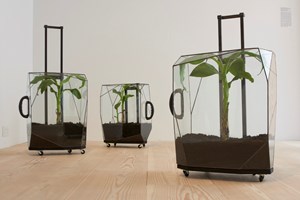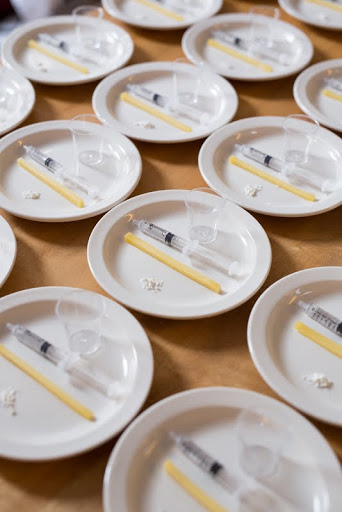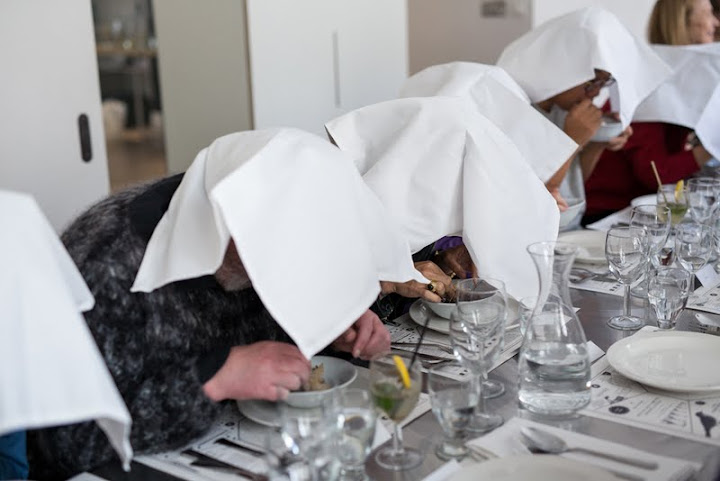
All art scenes tend to create communities and after living in a city for a while, one realises that those communities are often frequented by the same people. As a result, you can start to gain a homely feeling when attending art events and exhibitions. In the case of Delfina Foundation, this sensation of being with family is what defines this art centre, as one feels as comfortable as in their own living room or, perhaps, as in their own kitchen.
All art scenes tend to create communities and after living in a city for a while, one realises that those communities are often frequented by the same people. As a result, you can start to gain a homely feeling when attending art events and exhibitions. In the case of Delfina Foundation, this sensation of being with family is what defines this art centre, as one feels as comfortable as in their own living room or, perhaps, as in their own kitchen.
Besides being the home for their collection of artists in residence, the foundation organises dinners, lunches and other events to engage the art community and people from other disciplines involved in their programmes.
The foundation was created in 2007 by the renowned art patron Delfina Entrecanales CBE, often known as the artists’ grandmother. She was born in Spain and came to London over sixty years ago, where in 1988 she created the artist residence space Delfina Studio Trust, which closed in 2006.At the age of 80 she decided to create the foundation, focusing its interest especially on North African and Middle Eastern artists.

©Sylvain Deleu, Delfina Foundation
In 2014, after transforming their building, Delfina Foundation created Politics of Food, a programme that involves artist residencies, exhibitions and events that, from different perspectives, try to explore the topic of food, whether through cooking, aesthetics, economics or the apparently simple act of eating. Politics of Food, now about to finish its second edition, is an example of the participatory approach of the foundation’s events, usually designed to share viewpoints and create synergies from different disciplines, something essential in the current art world, permeable to social and political approaches.
The relationship we have with food is changing. We are becoming more aware of what we eat, where we buy and where it all comes from. The explosion of organic food has extended in Western countries and is becoming (slowly) affordable for everybody. There are documentaries and news that reveal social and work inequalities and chemical wars in agriculture. It is obvious that food goes beyond the borders of our tables, becoming something more than simple sustenance. We are getting used to the phrase “Eating is a political act”, used in workshops, talks, or even at the Expo Milano 2015. It is an economical act, a consumerist act, a social act, a scientific act, an historical act.

©Sylvain Deleu, Delfina Foundation
In the last years, cooking has also fused with art and experimentation. A clear example of this is elBulli Foundation, Ferran Adria’s former restaurant and now creativity centre which occupies the intersection between laboratory and kitchen. Marta Arzak, art consultant of her renowned family restaurant and head of education at Guggenheim Bilbao, curated the project that brought elBulli to documenta12 in Kassel in 2007. Arzak was selected as a researcher in residence for the second edition of Politics of Food, focusing her investigations on commensality, the act of eating together.
Like many other artists and researchers in residence, Marta Arzak had the opportunity not only to live for some weeks in the creative space of the foundation, but also to share her research process with other professionals involved in similar topics. The foundation also helps residents to get in contact with other researchers and institutions such as SOAS Food Studies Centre, enhancing creativity and providing a collaborative atmosphere.
The first season of Politics of food started with an enthusiastic impetus, bringing together 41 artists from 15 different countries in a programme curated in collaboration with Michael C. Vazquez. The inaugural edition explored topics such as social aspects of urban life through food and cooking (by Bahbak Hashemi-Nezhad, UK), the relation between colonial and multinational approaches to agriculture in Kenya (by Nairobi based artist James Muriuki) or the assimilation of a culture other than your own (by Lebanese artist Raed Lassin). Although the approximation to the politics of food was diverse and international, it gave art professionals and researchers the opportunity to experience a variety of different realities and perspectives all brought together on one space. The exhibition that accompanied this season included works by Abbas Akhavan, Gayle Chong Kwan, Leone Contini, Candice Lin, Asunción Molinos Gordo, Senam Okudzeto, Jae Yong Rhee, Zineb Sedira, Tadasu Takamine, and Raed Yassin.

©Sylvain Deleu, Delfina Foundation
The 2015 edition has been framed under the themes Sex, Diet and Disaster. On this occasion the show is titled Stirring the Pot of Story: Food, History, Memory and will be open until 13 June. The curator Nat Muller, who has also participated in the selection of artists in residence, has focused on the link between power and control of food.
The piece Cases of Confusion, by the duo Cooking-Sections, talks about how a gardener to British aristocracy introduced the Cavendish banana overseas in the 19th century. It was the only species to survive the plagues of Panama disease. The modern version of this story of colonisation of nature is told through three beautiful suitcases emulating Wardian cases and containing soil and banana trees in the maximum sizes allowed by Ryanair, EasyJet and British Airways.
Also addressing colonialism, there is a piece from Mella Jaarsma, a costume that includes references to the Dutch tea trade in the East Indies. We also find Christine Mackey’s homage to the repatriated pea and Leone Contini’s collections of canned food from the World War I Italian/Austro-Hungarian frontline.
Featured work from Raul Ayala Ortega and Mounira Al Solh are more visceral (both for different reasons) but evocative at the same time. The Mexican artist has built a Tower of Babel using fat, which gradually melts revealing an interior made of animal bones. It serves as a potent metaphor for decay and ruin. Al Solh presents a video which features images of animal organs while she evokes narratives around food, war and desire during the Lebanese civil war.and even an intimate narration by a pregnant woman who expresses the feeling of craving for food more vividly.

©Sylvain Deleu, Delfina Foundation
The exhibition only shows a thin layer of what Politics of Food explores in the wider context. The engaging part of the project is the diverse programme of events that run throughout the year.
Last year the Spanish artist Asunción Molinos (currently based in Cairo) had the chance to share progress on a research project carried out at Delfina Foundation. They organised a performative dinner called Ordinary Food. In this meal, Molinos focused on wheat as the main ingredient, introducing every course with facts, data and anecdotes and finishing the meal with a bread ice-cream.
In the 2015 edition, the foundation has also invited guests to share meals together. In a more dramatic approach, Michael Guggenheim and Judith Kroell have presented How Do We Want To Eat, If It Happens: An Emergency Provision Dinner, a dinner based on a selection of disaster scenarios. The foundation has also hosted meals focused on power and diplomacy and on changing relationships to food in the Russian Caucasus.

Performative dinner with Taus Makhacheva. Courtsesy Delfina Foundation
Besides these events, Politics of Food has also hosted tastings, seminars, performances, tours and talks. Other events involved more active participation from the guests, like this year’s hands-on fermentation workshop led by Daniel Salomon or the cheese making workshop This is Not Cheese, It's Dynamite with William Oglethorpe and STANDART THINKING.
Delfina Foundation also approaches other themes and programmes. These include performance in the form of the programme kmown as Performance as Process; the theme of Autonomy, an open conversation through exhibitions and events; and the upcoming second edition of The Public Domain, Grey Areas, Game Theories and Covert Ops. All themes have a multilayered perspective and use different formats to address the main theme and the ideas that arise from it. For now, The Politics of Food will come to an end soon, having exposed many more topics surrounding the act of eating than we could have imagined and having revealed many themes that will surely be explored in future editions.

Performative dinner based on a selection of disaster scenarios led by Michael Guggenheim and Judith Kroell. Courtesy Delfina Foundation

Performative dinner based on a selection of disaster scenarios led by Michael Guggenheim and Judith Kroell. Courtesy Delfina Foundation

Lunch. Courtesy Delfina Foundation

Lunch. Courtesy Delfina Foundation

ArtDependence Magazine is an international magazine covering all spheres of contemporary art, as well as modern and classical art.
ArtDependence features the latest art news, highlighting interviews with today’s most influential artists, galleries, curators, collectors, fair directors and individuals at the axis of the arts.
The magazine also covers series of articles and reviews on critical art events, new publications and other foremost happenings in the art world.
If you would like to submit events or editorial content to ArtDependence Magazine, please feel free to reach the magazine via the contact page.